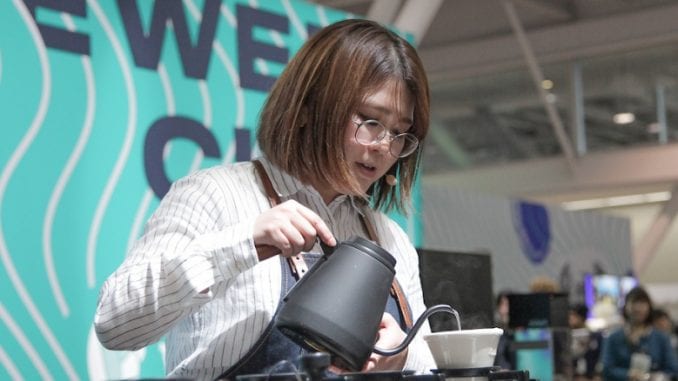
Chikako Nakai, the Brewers Cup champion of Japan, presents coffee in an easy-to-understand and accessible way.
BY ASHLEY RODRIGUEZ
BARISTA MAGAZINE ONLINE
Photos by Shaunté Glover for World Coffee Events
Chikako Nakai is the Brewers Cup champion of Japan and placed fourth at the World Brewers Cup Championship in Boston this past April. Chikako has been making coffee for the last 10 years and is an avid competitor—she has competed numerous times in Japan’s siphon brewing competitions, and is now making an impact on the global competition stage.
Chikako, who works for UCC Coffee Company in Japan, leads seminars on coffee brewing, and used this experience to inform her Brewers Cup routine. Serving a coffee from Ninety Plus, she focused on making her routine easy to understand and presenting information that was accessible and relatable.
If you didn’t get to see Chikako’s routine this year, don’t worry. She’s not done competing yet.
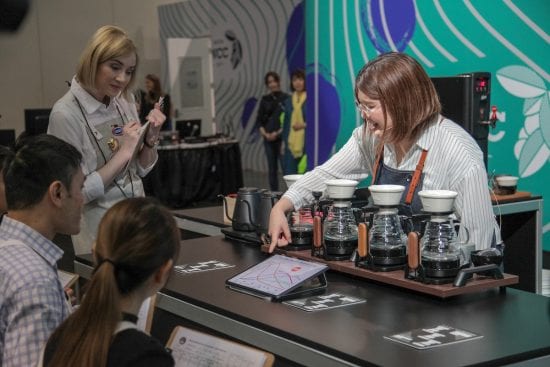
Ashley Rodriguez: What are your first memories of coffee?
Chikako Nakai: When I was a child, my parents gave me “UCC Milk Coffee.” This was my first coffee experience. It is a canned coffee beverage, sweetened with sugar and plenty of milk. During my childhood, in Japan, coffee was thought to be a beverage for adults. So, I remember when I first drank it, I felt I had grown up a little. Because of this experience, I feel a strong connection working at UCC Coffee Company right now.
How did you get into coffee? What is your current position and how did you get there?
It started with a part-time job at a major coffee chain after graduating from high school. I had thought that “all coffee has almost the same taste” before I worked at the coffee shop. However, I tried various kinds of coffee at the shop, and I was so surprised to notice the different tastes. From that moment, I began to love coffee more and more. When I was in college, I majored in music and wanted to be a music teacher. However, I wanted to get involved in the coffee industry. So, I changed my mind and tried to find a job at a coffee company. In the beginning, I worked at UCC Coffee shop as a barista and learned about store management. At the same time, I tried to compete in brewing competitions.
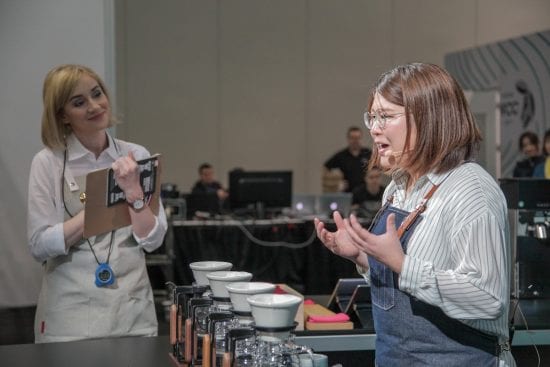
Recently, I was transferred to another section within the company. Currently, I support coffee seminars and events, and serve coffee to the customers while also continuing to train for competitions.
Have you competed before? What have you learned about competition through the years?
Yes, in previous years I mainly competed in the siphon championship. This is because the first coffee shop I worked at mostly served siphon coffee. I joined the siphon competition to brush up my brewing skills and make my customers smile with my siphon coffee. Now, to expand my skills with other brewing equipment, I’m competing in Brewers Cup, not just in siphon. Especially for the compulsory service in the World Brewers Cup, I needed to brew excellent coffee with limited amounts of coffee beans and time. I spent a lot of time practicing with various types of coffee. Because there are countless types of coffee in the world, a new discovery is fun every time.
Tell us about your coffee—what did you choose and why? What did it taste like? What did you tell the judges about your coffee?
In the World Brewers Cup Championship, I used coffee beans from Ninety Plus Gesha Estate in Panama. The coffee I brewed in the competition had various aromas like cream cheese, hibiscus tea, and apricot, and complex flavors such as cranberry, red cherry, apricot, orange, and kiwifruit. It was a really delicate coffee with so many flavors. Even with a slight adjustment, these flavors are easily affected by the roasting profile, aging time after roasting, brewing methods, air temperature, weather, and so on. I kept adjusting them backstage, even right before the presentation. After all the practice, I chose this particular coffee and set up the best brewing method fit for this coffee. In addition, I tried to make my presentation easy to understand and enjoyable for the judges and the audience.
Did you focus on a theme or central idea in your routine?
I wanted to share my brewing with everyone in an easy-to-understand presentation. After I discovered the coffee scale and app I used in the competition, I was able to talk with customers about what was happening during the extraction. I was so thrilled that I decided to use this scale. In addition, I worked with staff at the innovation center in my company to get scientific data. Based on the results, I created my brewing method. Everything started from my desire to talk to customers in an easy-to-understand way.
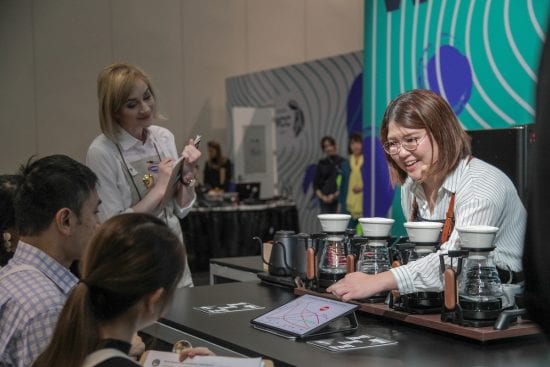
Why did you choose the brewing method you did? What was the process of refining your brewing method and recipe?
We analyzed five types of components like flavors, acidity, sweetness, bitterness, and astringency during the brewing timeline. The result indicated that positive components mainly appeared in the first half of the extraction and negative ones increased in the latter half. Based on this knowledge, we arranged the brewing method and made fine adjustments with sensory evaluation.
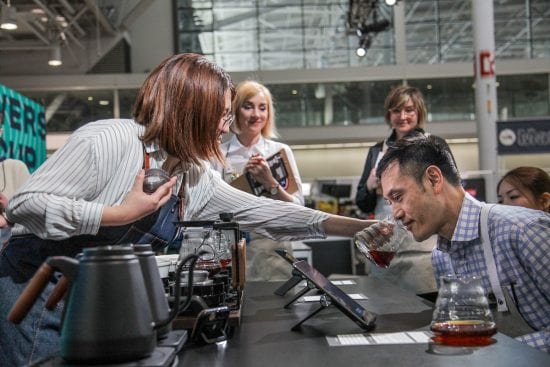
Did you change anything from the national competition to worlds?
Yes, I changed the coffee beans for open service. At the same time, I used a different dripper and filter. As for the compulsory service, I completely changed the brewing equipment. Furthermore, I changed the kettle for both open and compulsory service. Sometimes I feel a pain in my dominant hand, so as a barista I have to face this challenge every day. I found an adequate kettle that doesn’t strain my hand for as long as possible. I brushed up my skills step by step.
What does it mean to you to do so well in competition? What did it mean to you to represent your country?
In the World Brewers Cup, I was able to serve my coffee to people from all over the world and share my ideas about brewing. I was so excited and it makes me really happy. World Brewers Cup gave me the opportunity to talk with coffee lovers from all over the world.
Will you compete again?
Of course. For me, I’m just getting started.
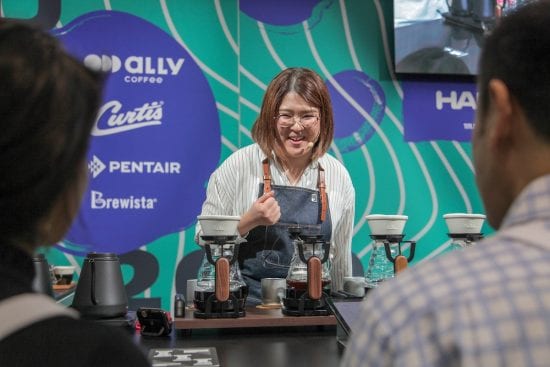
What do you want people to know about you?
I didn’t compete alone. I’m a part of a big team of coffee lovers like me. Thanks to the great efforts by all trainers, translator, supporters, roasters, laboratory staff, and many more, I was able to stand on the stage of the World Brewers Cup. Through these competitions, I would like to share the ideas about coffee with an open mind.
I wish for our coffee industry to develop more and more. It will be exciting to see the industry grow further, and it will be an honor for me to be able to support it.


